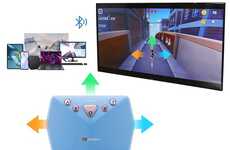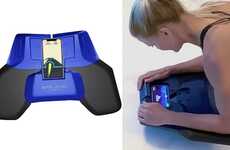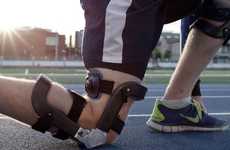
These Smart Should Pads Offers the Physically Impaired Gamified Exercise
Alyson Wyers — February 17, 2015 — Tech
References: fraunhofer.de & springwise
This smart shoulder pad and fitness game is designed to help thalidomide victims. Developed by the Munich-based Fraunhofer Institute, it gamifies exercise for the physically impaired and caters to their needs and limitations. These are sensed through the shoulder pads.
The unnamed fitness game is supposed to get the patient moving in a way that improves stamina, motor functions, overall fitness, coordination and concentration. Users control an on-screen avatar using movements in their upper body. They wear smart shoulder pads that contain sensors and act as a wearable controller. The movements are also recorded and sent to a tablet using Bluetooth technology. A tech-embedded seat cushion is also used to navigate the game, as is user voice control.
The unnamed fitness game is supposed to get the patient moving in a way that improves stamina, motor functions, overall fitness, coordination and concentration. Users control an on-screen avatar using movements in their upper body. They wear smart shoulder pads that contain sensors and act as a wearable controller. The movements are also recorded and sent to a tablet using Bluetooth technology. A tech-embedded seat cushion is also used to navigate the game, as is user voice control.
Trend Themes
1. Gamified Fitness - Creating interactive and engaging fitness experiences through gamification for people with physical impairments.
2. Wearable Controllers - Developing sensor-enabled wearable devices that act as controllers for interactive fitness games, enhancing accessibility and user experience.
3. Assistive Technology - Incorporating technology advancements to create assistive devices that cater to the needs and limitations of individuals with physical impairments, promoting physical activity and wellbeing.
Industry Implications
1. Healthcare Technology - Blending healthcare and technology to create innovative solutions for improving fitness and wellbeing of individuals with physical impairments.
2. Gaming - Integrating interactive gaming experiences with fitness elements to cater to a wider range of users, including individuals with physical impairments.
3. Wearable Technology - Developing sensor-embedded wearable devices that assist in monitoring physical movements and creating inclusive fitness experiences for people with physical impairments.
4.3
Score
Popularity
Activity
Freshness























